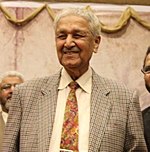
Abdul Qadeer Khan
Pakistani nuclear engineer (1936-2021)
Steven Chu is an American physicist and former government official. He is a Nobel laureate and was the 12th U.S. secretary of energy.
Table of Contents
Steven Chu is an American physicist and former government official. He is a Nobel laureate and was the 12th U.S. secretary of energy. He is currently the William R. Kenan Jr. Professor of Physics and Professor of Molecular and Cellular Physiology at Stanford University. He is known for his research at the University of California, Berkeley, and his research at Bell Laboratories and Stanford University regarding the cooling and trapping of atoms with laser light, for which he shared the 1997 Nobel Prize in Physics with Claude Cohen-Tannoudji and William Daniel Phillips.
Chu served as U.S. Secretary of Energy under the administration of President Barack Obama from 2009 to 2013. At the time of his appointment as Energy Secretary, Chu was a professor of physics and molecular and cellular biology at the University of California, Berkeley, and the director of the Lawrence Berkeley National Laboratory, where his research was concerned primarily with the study of biological systems at the single molecule level. Chu resigned as energy secretary on April 22, 2013. He returned to Stanford as Professor of Physics and Professor of Molecular & Cellular Physiology.
Chu is a vocal advocate for more research into renewable energy and nuclear power, arguing that a shift away from fossil fuels is essential to combating climate change. He has conceived of a global “glucose economy”, a form of a low-carbon economy, in which glucose from tropical plants is shipped around like oil is today. On February 22, 2019, Chu began a one-year term as president of the American Association for the Advancement of Science.
I performed adequately at school, but in comparison to my older brother, who set the record for the highest cumulative average for our high school, my performance was decidedly mediocre.
American physicist, former United States Secretary of Energy, Nobel laureate
I also developed an interest in sports, and played in informal games at a nearby school yard where the neighborhood children met to play touch football, baseball, basketball and occasionally, ice hockey.
American physicist, former United States Secretary of Energy, Nobel laureate
By the fourth grade, I graduated to an erector set and spent many happy hours constructing devices of unknown purpose where the main design criterion was to maximize the number of moving parts and overall size.
American physicist, former United States Secretary of Energy, Nobel laureate
Occasionally, I would focus on a particular school project and become obsessed with, what seemed to my mother, to be trivial details instead of apportioning the time I spent on school work in a more efficient way.
American physicist, former United States Secretary of Energy, Nobel laureate
The atoms become like a moth, seeking out the region of higher laser intensity.
American physicist, former United States Secretary of Energy, Nobel laureate
Education in my family was not merely emphasized, it was our raison d’etre.
American physicist, former United States Secretary of Energy, Nobel laureate
Geometry was the first exciting course I remember.
American physicist, former United States Secretary of Energy, Nobel laureate
My physics teacher, Thomas Miner was particularly gifted. To this day, I remember how he introduced the subject of physics. He told us we were going to learn how to deal with very simple questions such as how a body falls due to the acceleration of gravity.
American physicist, former United States Secretary of Energy, Nobel laureate
However, when my parents married in 1945, China was in turmoil and the possibility of returning grew increasingly remote, and they decided to begin their family in the United States.
American physicist, former United States Secretary of Energy, Nobel laureate
I think the Caribbean countries face rising oceans and they face increase in the severity of hurricanes. This is something that is very, very scary to all of us. The island states in the world represent – I remember this number – one-half of 1 percent of the carbon emissions in the world. And they will – some of them will disappear.
American physicist, former United States Secretary of Energy, Nobel laureate
So imagine a world 6 degrees warmer. It’s not going to recognize geographical boundaries. It’s not going to recognize anything. So agriculture regions today will be wiped out.
American physicist, former United States Secretary of Energy, Nobel laureate
At Rochester, I came with the same emotions as many of the entering freshman: everything was new, exciting and a bit overwhelming, but at least nobody had heard of my brothers and cousins.
American physicist, former United States Secretary of Energy, Nobel laureate
I approached the bulk of my schoolwork as a chore rather than an intellectual adventure.
American physicist, former United States Secretary of Energy, Nobel laureate
Let me state what the official IPCC prediction is: Sea levels could go up as much as three-quarters of a meter in this century, but there is a reasonable probability it could be much higher than that.
American physicist, former United States Secretary of Energy, Nobel laureate
There were only two other Chinese families in this town of 25,000, but to our parents, the determining factor was the quality of the public school system.
American physicist, former United States Secretary of Energy, Nobel laureate